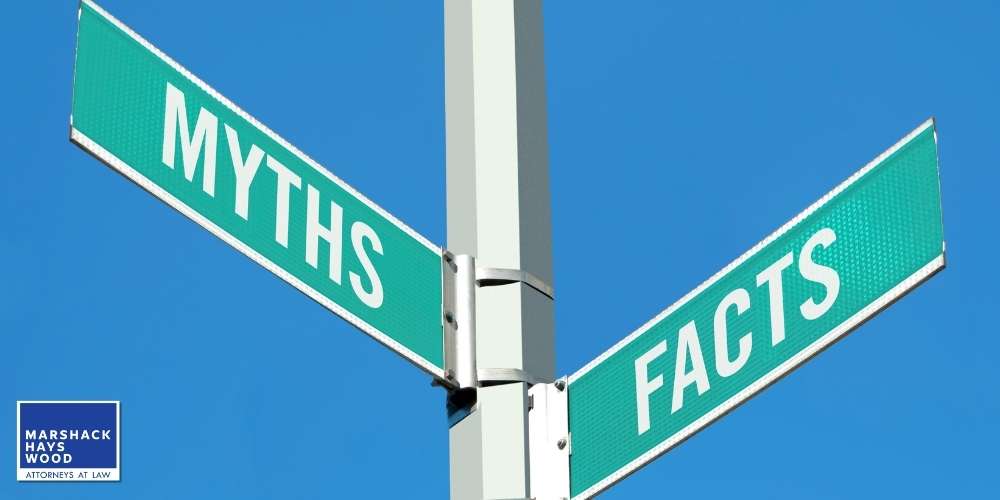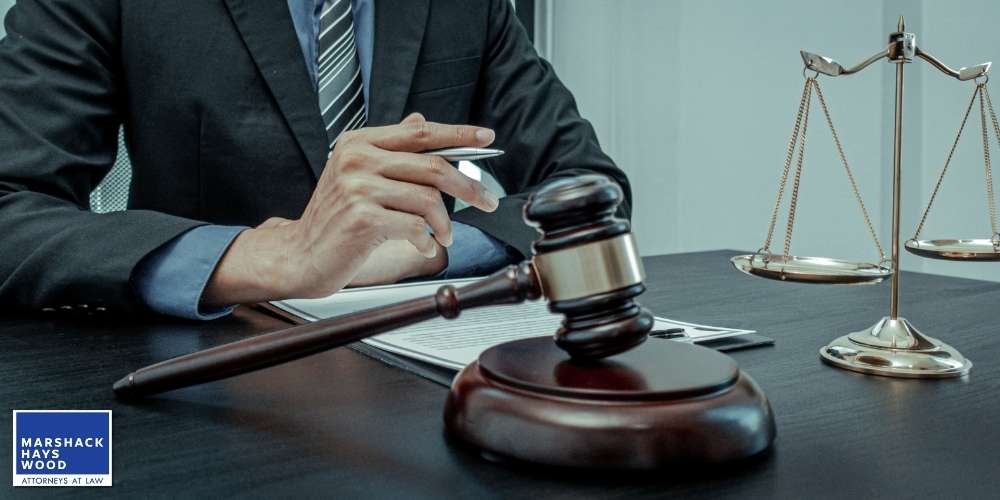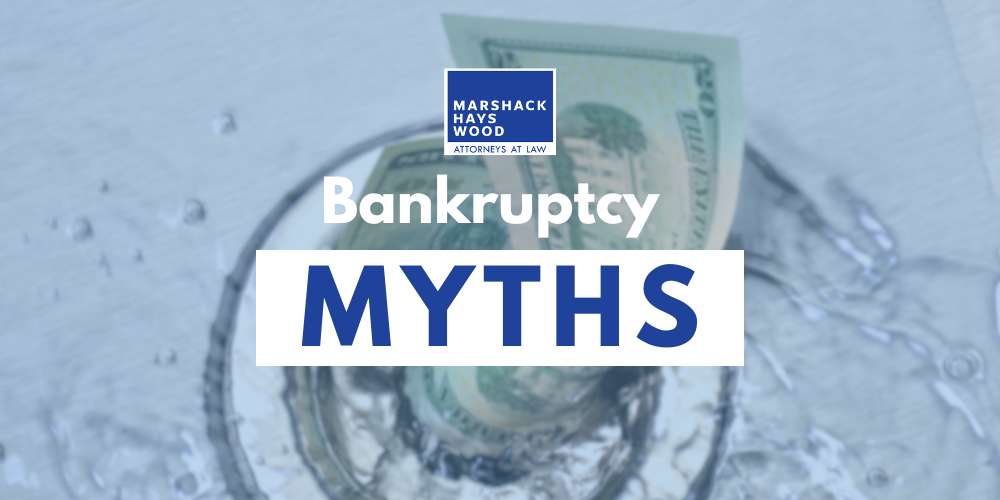Navigating the rough waters of bankruptcy in Orange County requires extensive legal knowledge and the ability to distinguish truth from myth. Filing bankruptcy is surrounded by misconceptions and inaccuracies that can lead to costly mistakes for those affected. At Marshack Hays Wood, we understand that bankruptcy filings have a bad reputation, which sadly prevents many individuals who would greatly benefit from a fresh start from filing. That’s why we’ve compiled a list of the Top 14 Bankruptcy Myths to help dispel any fears or misunderstandings you may have about filing for bankruptcy.
From the impact of bankruptcy on credit scores to the realities of asset liquidation, this list offers valuable insights and advice. By addressing these common myths, we hope to equip you with the knowledge to make informed decisions that lead to a more secure financial future.
If you’re ready to regain control of your financial situation, schedule a free consultation with an experienced bankruptcy attorney from Marshack Hays Wood. Call (949) 333-7777 today to start your bankruptcy journey.
Dispelling Common Bankruptcy Myths
Misinformation about filing for bankruptcy can lead to unnecessary fear and hesitation, preventing individuals and businesses from pursuing an achievable solution to their financial woes. By dispelling these all too common bankruptcy myths, individuals understand what bankruptcy involves, including its implications and benefits.
This knowledge can simplify the process, alleviate unwarranted concerns, and help decide whether bankruptcy is the right course of action for you. It also helps set realistic expectations about the outcomes of filing for bankruptcy, such as the effects on credit scores and asset management.

Top 14 Myths About Bankruptcy: Understanding the Truth
In the complex world of bankruptcy, it is easy to fall prey to false information. In the following section, our Orange County bankruptcy attorneys will debunk the top bankruptcy myths, from exaggerated fears about credit destruction to misunderstandings about asset forfeiture.
1. Filing Bankruptcy Will Ruin Your Credit Forever
While it’s true that a bankruptcy filing can have a significant impact on your credit score in the short term, it does not mean permanent financial ruin. In reality, bankruptcy can be a stepping stone towards rebuilding credit.
For those who file, life after bankruptcy often means a more manageable debt load, allowing them to focus on building and maintaining responsible financial habits. Over time, with careful financial planning and consistent payments, it’s entirely possible to rebuild a stronger credit report.
The key is understanding that bankruptcy is a temporary setback, not an endless financial downfall.
2. You Will Lose Everything in a Bankruptcy Filing
The myth that filing for bankruptcy means losing everything often discourages people from considering it a viable option. In reality, the bankruptcy process is designed to help individuals make a fresh start, not to strip them of all their possessions.
Depending on the type of bankruptcy filed, typically Chapter 7 or Chapter 13, and the specific state’s bankruptcy laws, many assets can be protected through exemptions. These exemptions often include necessities such as a primary residence, vehicle, personal belongings, and retirement savings.
The purpose of bankruptcy is not to leave individuals destitute but rather to provide a structured way to manage and reduce overwhelming debt while retaining the essentials needed to rebuild financial stability.
3. Filing for Bankruptcy is a Long, Complicated Process
While bankruptcy does involve a legal procedure with specific requirements and steps, it’s not necessarily an overly complicated process. The duration and complexity largely depend on the type of bankruptcy case filed. The timeline for Chapter 7 bankruptcy, a liquidation bankruptcy, typically resolves in a few months, whereas the Chapter 13 bankruptcy timeline, which is a reorganization bankruptcy, can take three to five years due to its repayment plan structure.
The bankruptcy process can be streamlined with the guidance of a knowledgeable bankruptcy attorney, who can help prepare the necessary documentation and represent the filer’s interests in bankruptcy court.
4. Only Failures and Irresponsible Spenders File for Bankruptcy
The stereotype that only failures and irresponsible spenders file for bankruptcy is not only inaccurate but also unfairly stigmatizing. Bankruptcy often results from unforeseen and uncontrollable circumstances such as medical emergencies, job loss, or economic downturns.
Hardships can impact even the most financially prudent individuals. In fact, many successful people have filed for bankruptcy at one time or another, either before their careers took off or in the midst of their success. For instance, celebrities like Elton John, Cyndi Lauper, and MC Hammer have filed bankruptcy, and even historical figures Walt Disney and Abraham Lincoln sought bankruptcy relief. Bankruptcy laws exist to provide a safety net for people facing such hardships, allowing them to reset their financial situation and emerge from under the burden of insurmountable debts.
It’s a legal tool designed for financial recovery and rebuilding, not a reflection of personal failure or irresponsibility.
5. Bankruptcy is Expensive
The notion that bankruptcy is expensive is another common misconception. While costs are involved, including bankruptcy filing fees, attorney fees, and costs for mandatory credit counseling, these expenses are often manageable and pale compared to the relief from overwhelming debt that bankruptcy can provide. The cost of filing for bankruptcy should be weighed against the long-term financial relief and the fresh start it offers.
When you consider the ongoing burden of unmanageable debt and accumulating interest and fees, that is far more costly in the long run than the one-time expense of filing for bankruptcy.
6. You Can Only File Bankruptcy Once in Your Life
There are no limits to the number of times you can file for bankruptcy, although there are specific time restrictions between filings. For instance, after a Chapter 7 discharge, you must wait eight years before filing another Chapter 7, but only four years for a Chapter 13. Similarly, after a Chapter 13 discharge, the waiting period is two years for another Chapter 13 and six years for a Chapter 7, with some exceptions.
These rules are in place to prevent abuse of the system but also ensure that bankruptcy remains available as a tool for those who experience multiple financial setbacks over their lifetime.
7. Bankruptcy Only Addresses Unsecured Debt
Bankruptcy can be applied to various debts, including unsecured debts and secured debts. Although unsecured debts like credit card debt and medical debt are more easily discharged in Chapter 7 bankruptcy, secured debts, including mortgages and car loans, can also be effectively managed.
Chapter 13 bankruptcy, in particular, allows individuals to reorganize their debts, which includes creating a manageable plan for paying off secured debts alongside unsecured ones like credit card debt and medical bills.
8. Bankruptcy Only Helps Those With Massive Debt
Bankruptcy can be an important decision for individuals and businesses facing various debt levels, not just for those with massive debt. It offers a pathway to manage and alleviate financial burdens, no matter the amount.
The decision to file a bankruptcy petition is often based on the inability to meet debt obligations and the need for a structured way to address financial challenges rather than the sheer size of the debt alone.
9. Only Unemployed People Can File Bankruptcy
Bankruptcy is a debt relief tool available to anyone, regardless of their employment status. Both employed and unemployed individuals can seek bankruptcy protection when they cannot pay their debts.
The key factor in qualifying for bankruptcy is not employment status but rather being unable to pay debts as they become due.
10. Bankruptcy Will Affect Your Retirement Savings
In many bankruptcy cases, retirement accounts, such as 401(k)s, IRAs, and other qualified retirement plans, are protected under federal and state exemption laws. This means that, in most instances, these savings are shielded from being used to pay off creditors. Of course, the specifics can vary depending on the type of bankruptcy filed and applicable state laws, so it’s crucial for those considering bankruptcy to consult with a knowledgeable bankruptcy lawyer like those at Marshack Hays Wood to understand how their retirement savings might be affected in their bankruptcy case.
In most cases, however, California’s bankruptcy exemptions ensure that individuals are not left without any means of support in their retirement years.
11. Married Couples Must File Bankruptcy Together
Another common bankruptcy myth is that married couples are required to file for bankruptcy together. In reality, spouses have the option to file bankruptcy jointly when married or individually. The decision depends on various factors, such as whose name the debts are under and the property ownership status.
Filing jointly can be beneficial if both partners have debts that need to be addressed, as it allows for the consolidation of debts and legal fees. However, if one spouse has a significant amount of debt and the other does not, it may be better for them to file individually.
12. Bankruptcy is Not for Businesses
Bankruptcy isn’t just for individuals looking for debt relief. Bankruptcy law includes small enterprises and large corporations as a way to alleviate their financial difficulties. Different chapters of the Bankruptcy Code cater to various business needs. For example, Chapter 11 bankruptcy is commonly used by businesses to restructure their debts while continuing to operate. For smaller businesses, Chapter 13 can provide a similar restructuring process.
These options allow businesses to renegotiate terms with creditors, reorganize debts, and sometimes discharge certain obligations, providing a pathway to financial recovery and continued operation.
13. Bankruptcy Will Make You Lose Security Clearance
While financial stability is a factor in determining eligibility for security clearance, filing for bankruptcy does not necessarily result in its revocation or denial. Responsibly addressing financial issues through bankruptcy can sometimes be viewed positively, as it demonstrates proactive management of one’s financial situation. Security clearance evaluations are comprehensive and consider the reasons behind the financial difficulty, such as unforeseen medical expenses or job loss, and the steps taken to resolve these issues.
Each case is assessed individually, and a bankruptcy filing is just one of many factors considered.
14. You Can Go on a Spending Spree Before Filing Bankruptcy
Spending a lot of money before you file bankruptcy can have serious legal consequences. Such behavior is often seen as fraudulent by the bankruptcy court, as this process is meant to provide relief for debts incurred in good faith, not for recent, reckless expenditures.
In fact, debts stemming from luxury purchases made shortly before filing may not be eligible for discharge, and such actions can lead to allegations of bankruptcy fraud.

Take Advantage of the Bankruptcy Laws That Protect You
California’s bankruptcy laws offer a fresh start, freeing debtors from overwhelming burdens while ensuring fair treatment to creditors. Key protections include the automatic stay, which halts most creditor actions immediately upon filing for bankruptcy, exemptions that protect essential assets like a primary home or vehicle, and the eventual discharge of qualifying debts.
It’s important to recognize that these laws serve as a safety net, and taking advantage of them offers a structured path to reorganize or eliminate debts and rebuild financially.
Contact an Orange County Bankruptcy Attorney Today
There are many bankruptcy myths out there that cause unnecessary fear or confusion, such as believing only irresponsible people file bankruptcy or that you’ll lose everything you own. In reality, bankruptcy is a legal tool designed to help people who file get back on their feet.
Our experienced Southern California bankruptcy attorneys at Marshack Hays Wood are experienced in addressing bankruptcy court issues and can help you separate bankruptcy facts from fiction, so you can make an informed decision about your financial future.
Whether you’re dealing with overwhelming debt or simply exploring your options, our team will explain when filing makes sense and how to do it in a way that protects your best interests. With Marshack Hays Wood, you receive more than just legal help—you gain trusted advocates committed to your recovery. Call us today at (949) 333-7777 to schedule your consultation and take the first step toward lasting financial relief.

